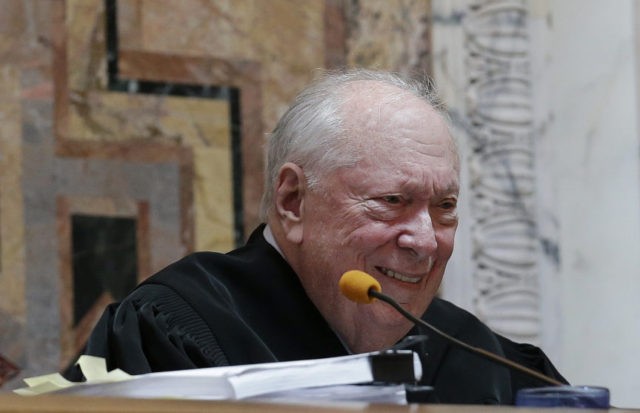SAN FRANCISCO (AP) — Judge Stephen Reinhardt was an unabashed liberal on what’s widely considered the nation’s most left-leaning appeals court, the 9th U.S. Circuit Court of Appeals.
The judge who died Thursday had blasted President Bill Clinton’s administration in a 1994 New York Times article for what he said was its failure to nominate liberal judges and urged then-U.S. Supreme Court nominee Stephen Breyer to “not let the spirit of liberalism be extinguished.”
“Someone must carry on the work of the court’s great progressive thinkers,” he wrote in the Los Angeles Times in 1994. “The justices who ended de jure racial segregation, brought us one man/one vote, opened the courts to the poor and needy, established the right to counsel for all defendants, gave women true legal equality.”
Reinhardt died of a heart attack during a visit to a dermatologist in Los Angeles, 9th Circuit spokesman David Madden said. He was 87 and still an active member of the court he joined in 1980 after being nominated by President Jimmy Carter.
Reinhardt’s outspoken liberalism was unusual for a judge.
“I think he really wore it on his sleeve in some ways,” said Carl Tobias, a professor at the University of Richmond School of Law and expert on the selection of federal judges.
Supporters lauded him as a champion of immigrants, prisoners and the disadvantaged. Critics said his decisions were extreme.
Utah Sen. Orrin Hatch, a Republican, called Reinhardt “brilliant” during confirmation hearings for another judge in 2003 but said “many justly criticize his activist approach.”
Reinhardt joined another judge in ruling in 2002 that the words “under God” in the Pledge of Allegiance were unconstitutional.
Then-President George W. Bush called the decision ridiculous, and California’s Democratic governor at the time, Gray Davis, defended the pledge as “one of our most profound human expressions of American patriotism.”
The 9th Circuit later overturned the decision, but not without a dissent from Reinhardt, who maintained that “under God” had an unconstitutional religious purpose.
Other appeals court judges remembered him as an advocate for civil rights and civil liberties.
“Judge Reinhardt was inspiring in how he cared about the less fortunate, about individuals charged with crimes or incarcerated,” 9th Circuit Judge Richard Paez said in a statement. “His concern that they be treated fairly and humanely was just an inspiration to me.”
Arthur Hellman, a law professor at the University of Pittsburgh and a scholar of the 9th Circuit, said Reinhardt served at a time when the U.S. Supreme Court was becoming more conservative. That change, combined with his sharp intellect, turned him into a “leader of the opposition.”
Reinhardt wrote a 1996 opinion that struck down a Washington state law prohibiting doctors from prescribing medication to help terminally ill patients die and a 2012 decision invalidating California’s gay marriage ban.
He wrote that the ban “serves no purpose, and has no effect, other than to lessen the status and human dignity of gays and lesbians in California, and to officially reclassify their relationships and families as inferior to those of opposite-sex couples.”
Last year, Reinhardt chastised the Trump administration for ordering the deportation of a man who entered the country illegally nearly three decades ago and became a respected businessman in Hawaii, calling it “inhumane” and “contrary to the values of the country and its legal system.”
Reinhardt also was an advocate for prisoners and blasted the U.S. Supreme Court in a 2015 article for decisions he said prevented courts from freeing prisoners even when they experienced glaring constitutional violations.
“He was an old-fashioned liberal,” Hellman said. “Skeptical of the exercise of power by large institutions, whether governmental or non-governmental.”

COMMENTS
Please let us know if you're having issues with commenting.